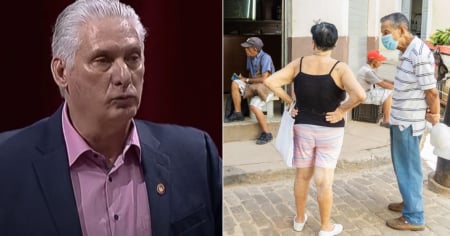Cuban leader Miguel Díaz-Canel reiterated that the National Assembly of People's Power (ANPP) is "the most representative in the world."
In his closing speech at the fourth ordinary session of this governing body, the also first secretary of the Communist Party of Cuba (PCC) defended the composition of Cuba's one-party parliament, asserting that it authentically reflects the diversity of the Cuban people.
"Those who demand democracy for Cuba without understanding what they are asking for should look at these women and men who live and face the same difficulties as their neighbors," declared Díaz-Canel. He also emphasized the diversity of the members of the ANPP and expressed his striking belief that there is "no other assembly in the world with members who resemble the people they represent more closely."
"Young and not so young, white, black, mulatto, mestizo, all of them—workers, farmers, teachers, doctors, economists, artists, intellectuals, athletes, self-employed individuals, innovators, scientists... I don't believe there is another assembly in the world with members who resemble more the people they represent," said the leader appointed by General Raúl Castro.
However, Díaz-Canel's statements have consistently been subject to criticism both inside and outside the island.
Despite the regime's efforts to project an image of inclusivity, opposing voices and international experts question the authenticity of this representation. The ANPP is composed exclusively of members aligned with the PCC, which restricts the ideological spectrum and excludes critical opinions.
A parliament that prides itself on being representative must reflect the plurality of ideas, perspectives, and political positions that characterize a diverse society. In democracies, this plurality is ensured through free elections, multi-partisanship, and freedom of expression.
In this way, various social and political groups can debate, propose, and oppose, building a system that truly represents collective interests while respecting diversity. In contrast, the ANPP operates under a framework where all decisions are validated by the PCC, eliminating any possibility of dissent or genuine debate.
Representation should not be limited to a composition that reflects demographic factors such as race, gender, or occupation. While these elements are important, they lack significance if they are not accompanied by the freedom to express critical ideas or to propose alternatives.
More than partisan uniformity, a truly representative Assembly requires and needs political diversity, tolerance for differences, and effective mechanisms for the voices of the people to transform into tangible legislative actions. This is something that, according to analysts and critics, is absent in the Cuban model, where absolute control limits any possibility of genuine popular representation.
Previous reports published by CiberCuba have highlighted how the Cuban Parliament operates under a system that ensures unanimity in its voting process.
In 2024, the Assembly approved all the measures proposed by the Executive without a single vote against, a situation that civil society constantly highlights as an example of the absence of genuine internal debate.
This behavior repeats itself year after year, just as reported in 2021, when Díaz-Canel used the ANPP to categorically deny the existence of imprisoned children in Cuba, despite international reports and family testimonies exposing cases of minors jailed following the massive protests of July 11.
Additionally, the discourse surrounding the "authenticity" of Cuban democracy has also been challenged due to the lack of mechanisms for genuine citizen participation. In 2021, during a period of heightened social tension, Díaz-Canel referred to Cuba as a "rare dictatorship" in response to international criticism, downplaying the grievances of the people regarding the absence of rights and political freedoms.
Another point of criticism has been the lack of transparency in the selection processes for deputies. While Díaz-Canel defends the diversity of occupations and races in Parliament, opponents emphasize that all candidates are endorsed by the PCC, which removes any possibility of competition or independent representation.
Inspired by the maxim of Joseph Goebbels (Minister of Public Enlightenment and Propaganda of Adolf Hitler's Third Reich) that "a lie repeated a thousand times becomes a truth," the totalitarian communist regime that has ruled Cuba for over 60 years through violent imposition insists on presenting the National Assembly of People's Power (ANPP) as an example of democracy and representation in order to "legitimize" itself.
However, the lack of genuine political debate, the absence of real participation, and the exclusion of critical voices reduce the ANPP to an instrument serving the interests of the PCC rather than the people it claims to represent—something that is increasingly condemned by Cuban civil society and international organizations.
Filed under:
